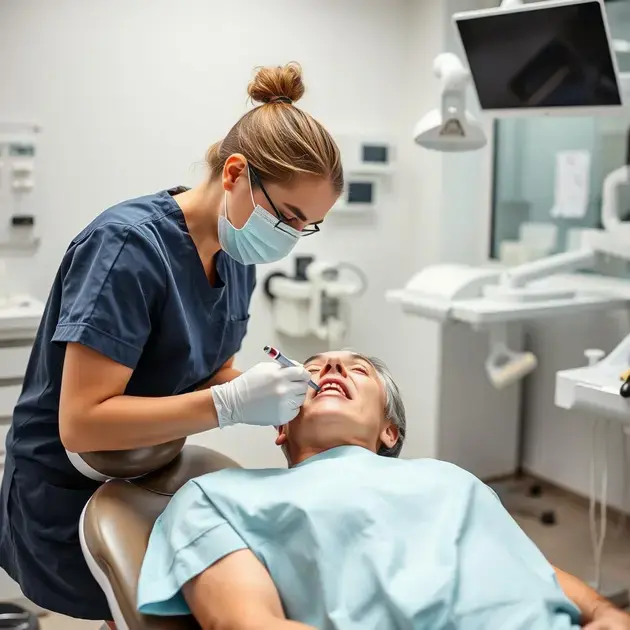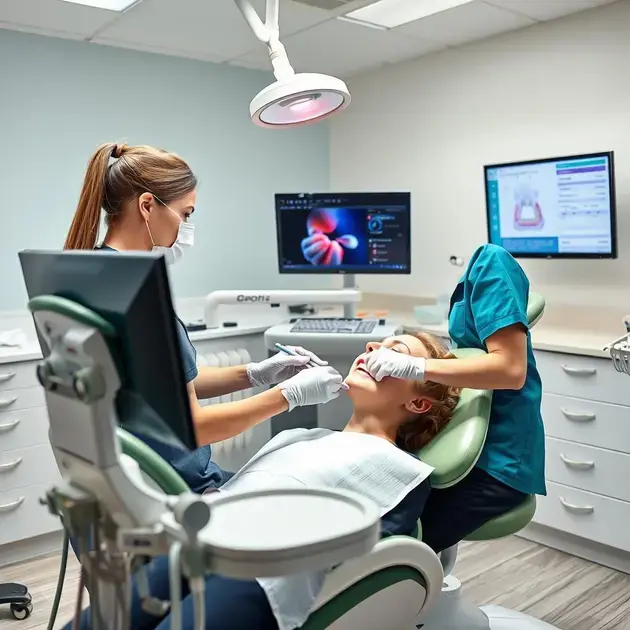Dental Cleaning: How Important Is It?
Regular dental cleanings are crucial for maintaining good oral health, but just how important are they really? In this article, we delve into the significance of dental cleanings and why they should not be underestimated.
From preventing tooth decay to detecting early signs of oral diseases, the benefits of routine dental cleanings extend far beyond just a brighter smile. Find out why making time for regular dental cleanings can have a lasting impact on your overall well-being.

The Significance of Dental Cleanings in Maintaining Oral Health
The Importance of Dental Cleanings
Regular dental cleanings play a pivotal role in maintaining optimal oral health. These cleanings are essential for removing plaque buildup, tartar, and bacteria that can lead to cavities, gum disease, and other oral health issues. Professional cleanings also help prevent bad breath, tooth decay, and costly dental procedures in the long run.
Step-by-Step Guide: How Dental Cleanings Maintain Oral Health
1. Tartar Removal: Dental cleanings remove hardened tartar that cannot be removed by brushing alone, preventing gum inflammation and potential infections.
2. Early Detection: During cleanings, dentists can identify early signs of cavities, gum disease, and oral cancers, facilitating prompt treatment and preventing further complications.
3. Fresher Breath: Cleanings eliminate bacteria that cause bad breath, leaving your mouth feeling fresh and clean.
4. Oral Health Education: Dental professionals provide valuable tips on proper oral hygiene practices, empowering patients to better care for their teeth and gums.
5. Overall Well-Being: Maintaining good oral health through regular cleanings contributes to your overall health and well-being, as oral health is closely linked to systemic health issues.
The Impact on Oral Health
Without regular dental cleanings, plaque and tartar can accumulate, leading to gum disease, tooth decay, and potential tooth loss. These issues not only impact oral health but can also affect overall well-being and quality of life. Neglecting dental cleanings can result in costly and invasive dental procedures down the line, emphasizing the critical role these cleanings play in oral health maintenance.
The Far-Reaching Benefits of Routine Dental Cleanings
Comprehensive Dental Care Benefits
Engaging in routine dental cleanings offers a myriad of benefits that extend beyond oral health. From preventive measures to enhancing confidence through a brighter smile, the advantages of consistent dental care are far-reaching and impactful.
Step-by-Step Guide: The Benefits of Routine Cleanings
1. Preventive Care: Regular cleanings prevent oral health issues before they escalate, reducing the need for extensive dental treatments.
2. Brighter Smile: Cleanings remove stains and discoloration, enhancing the aesthetic appeal of your smile and boosting self-confidence.
3. Health Monitoring: Dentists can identify changes in your oral health over time, allowing for early intervention and prevention of potential complications.
4. Cavity Prevention: Professional cleanings help remove bacteria that cause cavities, reducing the risk of decay and enhancing overall oral health.
5. Long-Term Savings: By investing in routine cleanings, individuals can avoid costly dental procedures in the future, saving both money and discomfort.
Enhancing Overall Well-Being
Routine dental cleanings contribute not only to a healthy smile but also to a healthier lifestyle. The benefits of maintaining regular dental appointments extend to overall well-being, emphasizing the holistic impact of consistent oral care practices.
The Lasting Impact of Regular Dental Cleanings on Overall Well-Being
Holistic Approach to Health
The effects of regular dental cleanings extend far beyond oral health, impacting overall well-being and systemic health. By prioritizing routine cleanings, individuals can safeguard their health and well-being in the long term.
Step-by-Step Guide: Long-Term Benefits of Dental Cleanings
1. Improved Systemic Health: Regular cleanings reduce the risk of systemic health issues linked to poor oral health, such as heart disease, diabetes, and respiratory infections.
2. Mental Wellbeing: A healthy smile boosts confidence, improves self-esteem, and contributes to mental well-being, highlighting the emotional benefits of routine dental care.
3. Enhanced Quality of Life: By maintaining good oral health through regular cleanings, individuals can enjoy a higher quality of life, free from the pain and discomfort of dental issues.
4. Longevity: Oral health is closely tied to longevity, and regular cleanings play a vital role in promoting overall health and extending life expectancy.
5. Comprehensive Wellness: Regular dental cleanings are an essential component of holistic wellness, ensuring that individuals take proactive steps to care for their oral and overall health.

Understanding the Process of Dental Cleaning and Its Importance
When it comes to maintaining good oral health, dental cleaning plays a crucial role. The process of dental cleaning involves several steps that are essential for keeping your teeth and gums healthy. Firstly, the dental hygienist will examine your mouth to check for any signs of issues like cavities or gum disease. Next, they will use specialized tools to remove plaque and tartar buildup from your teeth. This step is crucial as it helps prevent tooth decay and gum disease.
After cleaning your teeth thoroughly, the hygienist will floss between your teeth to remove any remaining plaque or debris. This step is important for preventing cavities and gum disease in hard-to-reach areas. Finally, the hygienist will polish your teeth to remove surface stains and make your smile sparkle.
Understanding the importance of dental cleaning is key to maintaining good oral health. Regular dental cleaning appointments can help prevent issues like cavities, gum disease, and bad breath. It also allows your dentist to detect any potential problems early on, saving you from more extensive treatments down the road.
By following a consistent routine of dental cleaning appointments, you can enjoy a healthy and beautiful smile for years to come.
Exploring Advanced Techniques for Effective Dental Cleaning
Advanced techniques for dental cleaning can take your oral hygiene to the next level. One effective technique is the use of ultrasonic scalers, which use high-frequency vibrations to remove plaque and tartar from your teeth. This method is not only more efficient but also gentler on your teeth compared to traditional scaling tools.
Another advanced technique is air polishing, which uses a combination of water, air, and baking soda to remove surface stains from your teeth. This method is highly effective in restoring the natural whiteness of your teeth without causing any damage to the enamel.
In addition to advanced tools, incorporating techniques like fluoride treatments and dental sealants can provide extra protection against cavities and tooth decay. Fluoride helps strengthen the enamel, while sealants act as a barrier against bacteria and food particles.
By exploring these advanced techniques and discussing them with your dental hygienist, you can tailor your dental cleaning routine to meet your specific oral health needs for a cleaner, healthier smile.
Tips for Maintaining Oral Hygiene Between Dental Cleaning Sessions
Maintaining good oral hygiene between dental cleaning sessions is essential for prolonging the benefits of your professional cleanings. One tip is to brush your teeth at least twice a day using fluoride toothpaste. Brushing helps remove plaque and food particles that can lead to tooth decay and gum disease.
Flossing daily is another crucial habit to maintain oral hygiene. Flossing helps remove plaque and debris from between your teeth, areas that are difficult to reach with a toothbrush. This simple step can prevent cavities and gum inflammation.
Using an antibacterial mouthwash can further enhance your oral hygiene routine by killing bacteria that cause bad breath and gum disease. Mouthwash reaches areas in your mouth that brushing and flossing may miss, providing comprehensive protection against oral issues.
Lastly, maintaining a balanced diet rich in fruits and vegetables while limiting sugary and acidic foods can contribute to better oral health. Making small lifestyle changes like drinking plenty of water and avoiding tobacco products can also help maintain a clean and healthy mouth between your regular dental cleaning appointments.
Conclusion
Regular dental cleanings are essential for maintaining both oral health and overall well-being. By removing plaque and tartar, these professional cleanings prevent gum disease, cavities, and other serious dental issues that could require costly treatments down the line. Furthermore, the cleaning process allows dental professionals to identify any early signs of complications, enabling prompt intervention and protection of your health.
The advantages of routine dental cleanings extend beyond just the mouth. A bright, clean smile can boost your confidence, positively affecting your mental well-being. Additionally, maintaining good oral hygiene is linked to improved systemic health, helping to reduce the risk of chronic diseases such as heart disease and diabetes. Investing in regular dental appointments can lead to long-term health benefits, enhancing your quality of life.
Overall, prioritizing dental cleanings as part of your health routine is a wise decision. They not only ensure your teeth remain clean and free from disease but also contribute to a healthier lifestyle. By engaging with dental professionals and committing to good oral hygiene practices, you empower yourself to enjoy a brighter smile and better health for years to come.
